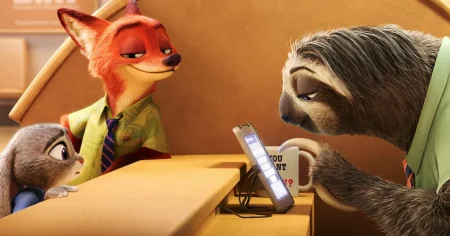Disney’s grand Christmas film, ”Mufasa: The Lion King,” delves into the backstory of the iconic character Mufasa, Simba’s revered father from the monumental hit ”The Lion King.” While boasting breathtaking visuals and an impressive technical prowess, the film ultimately struggles to escape the shadow of its predecessor, feeling more like a calculated commercial venture than a genuine artistic endeavor. Despite the involvement of acclaimed director Barry Jenkins, known for his nuanced and emotionally resonant work in ”Moonlight,” the narrative feels predictable and lacks the emotional depth that characterized the original. The film retreads familiar territory, offering a sanitized and somewhat simplistic portrayal of Mufasa’s rise to power, failing to capture the complex themes of responsibility, loss, and the circle of life that resonated so deeply with audiences in the original.
The story unfolds through flashbacks narrated by Rafiki, Timon, and Pumbaa, recounting Mufasa’s humble beginnings as an orphaned cub. We witness his journey of survival, his encounter with his future queen, Sarabi, and his eventual ascension to kingship. While the film attempts to imbue Mufasa with a sense of vulnerability and inner conflict, these moments feel contrived and lack the genuine emotional weight that would elevate the narrative beyond a mere prequel. The dialogue often feels clunky and exposition-heavy, struggling to capture the poetic beauty and subtle humor that distinguished the original film’s script. The film’s reliance on CGI, while technically impressive, creates a sense of detachment, diminishing the emotional impact of the characters’ journeys and struggles. The vibrant and detailed landscapes of the Pride Lands, while visually stunning, lack the tactile and organic feel of the hand-drawn animation that gave the original its timeless charm.
Barry Jenkins’ directorial influence is discernible in certain stylistic choices, particularly in the film’s pacing and its attempts to explore themes of family and community. However, these moments feel fleeting and ultimately overshadowed by the film’s broader commercial ambitions. The narrative structure, constrained by the prequel format, limits Jenkins’ ability to fully explore the complex themes and emotional depths that characterize his previous work. The film feels burdened by its connection to the original, constantly referencing familiar characters and events, preventing it from establishing its own unique identity. The pressure to appease fans of ”The Lion King” while simultaneously crafting a compelling standalone story seems to have stifled Jenkins’ creative vision, resulting in a film that feels both familiar and strangely disconnected from its source material.
The musical score, while competently crafted, lacks the memorable melodies and emotional resonance of the original’s iconic soundtrack. The new songs feel generic and fail to capture the spirit and cultural nuances that made the original’s music so enduring. The absence of Hans Zimmer’s distinctive musical touch is palpable, leaving a void that the new score struggles to fill. The film’s reliance on familiar musical motifs from the original further reinforces its derivative nature, highlighting its inability to stand on its own artistic merits. The overall auditory experience, while technically proficient, lacks the emotional depth and cultural richness that contributed to the original’s lasting impact.
Furthermore, the film’s portrayal of the villains feels underdeveloped and lacks the menacing presence of Scar in the original. The antagonists in ”Mufasa” are portrayed as one-dimensional and their motivations feel simplistic and unconvincing. Their actions lack the emotional impact and psychological complexity that made Scar such a compelling and memorable villain. The film’s attempts to explore their backstories feel rushed and superficial, failing to provide the depth of characterization that would make them truly formidable adversaries. The absence of a truly compelling antagonist further weakens the narrative, diminishing the stakes and undermining the emotional impact of Mufasa’s journey.
In conclusion, ”Mufasa: The Lion King,” despite its impressive visuals and technical achievements, falls short of capturing the magic and emotional depth of its predecessor. The film feels like a calculated commercial venture, capitalizing on the nostalgia and popularity of ”The Lion King” while failing to offer a truly compelling narrative or explore new thematic ground. Despite Barry Jenkins’ directorial involvement, the film struggles to escape the shadow of the original, feeling constrained by the prequel format and the pressure to appease existing fans. Ultimately, the film serves as a reminder that technical prowess and visual spectacle cannot compensate for a lack of genuine emotional resonance and a compelling story. While it may entertain younger audiences unfamiliar with the original, it’s unlikely to resonate with those who cherish the timeless magic and emotional depth of ”The Lion King.”














